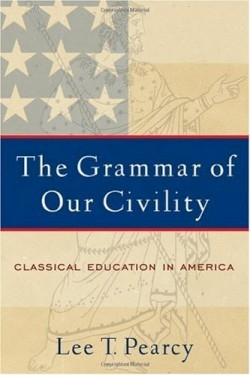The Grammar of Our Civility
Classical Education in America
Either the study of Latin is culturally irrelevant, utterly useless, elitist, and too difficult, or it is “a classical superstructure … alienated from its socioeconomic base” that nonetheless retains an inherent value in our educational system. Since the eighteenth century, educators as influential as John Locke have argued that it is “ridiculous … that a father should waste his own money, and his son’s time, in setting him to learn the Roman language.”
Conceived originally as a common conceptual grammar for the small group of young men destined to become clergy, soldiers, and statesmen, the value of studying Latin has been increasingly questioned as those occupations have been displaced by the managerial and business classes. As the United States began to define itself as a nation, the controversy over Classical Studies became a way to debate what the nature of the new republic should be.
This slim, engaging volume argues that American universities since the eighteenth century have sacrificed Altertumwissenschaft, or “the scholarly study of what survives from classical antiquity,” for the utilitarian goal of teaching students how to earn a paycheck. The author, whose previous publications include The Meditated Muse: English Translations of Ovid and New First Steps in Latin, cites many colorful moments in this debate, such as President Andrew Jackson’s apocryphal Latin speech to the assembled faculty of Harvard: “Ex post facto; e pluribus unum; sic semper tyrannis; quid pro quo.” Pearcy convincingly argues that the point of this story is to demonstrate how an ordinary American can triumph over all the institutionalized learning of Europe and its pretentious American imitators. He compares today’s American classicists to members of a “Cargo Cult,” devoutly imitating a form that has become devoid of content.
Pearcy articulates several reasons why Classical Studies are in the throes of a spasmodic death. The deconstruction of truth and objectivity, the rise of science, and the growing perception that mind and body are inextricably and biologically linked have all played a part. However, just as the now nearly hopeless reader begins to wonder why the author wrote his book in the first place, Pearcy offers “an American form of classical education grounded in American personal and social reality.” Americans need, he argues, to re-present the past as well as merely presenting it. This form of Altertumwissenschaft will enable people to create “a grammar of our own civility and learn a language in which we can speak of our own humanity to one another.” When all is said and done, isn’t that what an educated person is supposed to be able to do?
Reviewed by
Elizabeth Breau
Disclosure: This article is not an endorsement, but a review. The publisher of this book provided free copies of the book to have their book reviewed by a professional reviewer. No fee was paid by the publisher for this review. Foreword Reviews only recommends books that we love. Foreword Magazine, Inc. is disclosing this in accordance with the Federal Trade Commission’s 16 CFR, Part 255.

